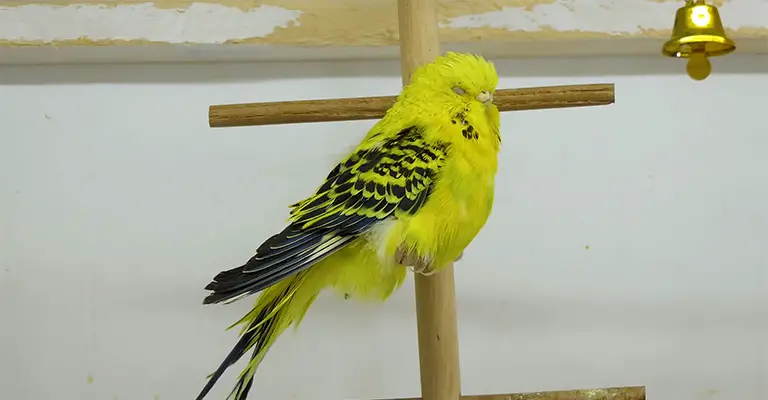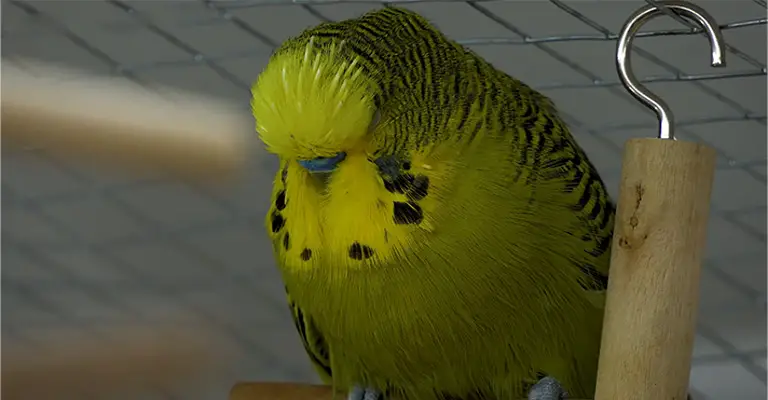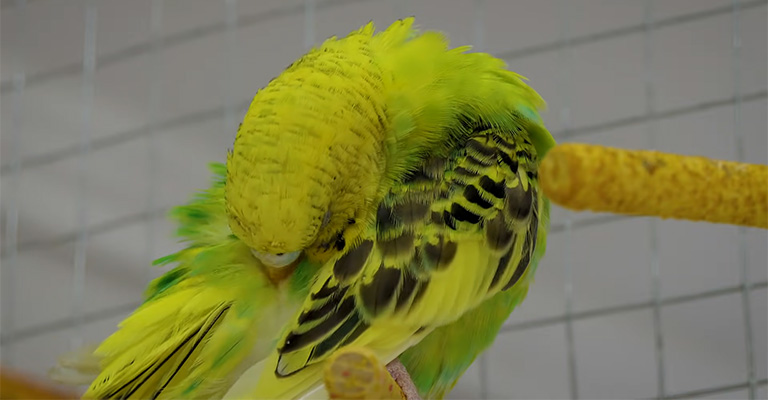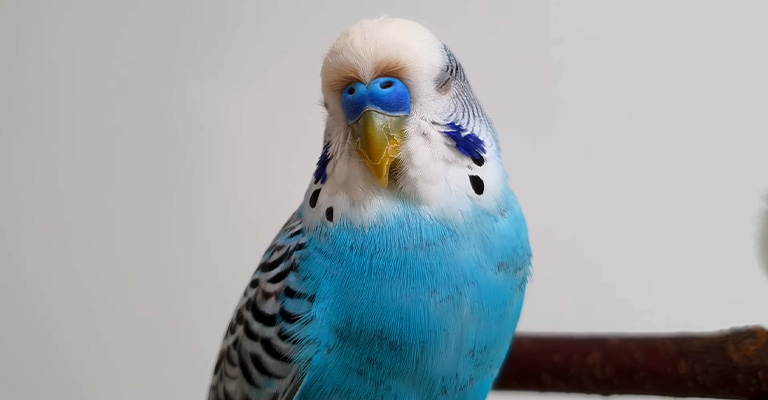Budgies, also known as budgerigars or parakeets, are small, colorful birds that have become popular pets worldwide. These lively and intelligent creatures have unique care requirements, including adequate sleep to maintain their health and well-being.
A common question among budgie owners is whether these charming birds need darkness to sleep. In this article, we will explore the sleep patterns of budgies, their sleep requirements, and the role darkness plays in facilitating their restful sleep.
Understanding the importance of providing a suitable sleeping environment for budgies can help ensure their overall health and happiness. So, let’s delve into the fascinating world of budgie sleep and answer the question: “Do budgies need darkness to sleep?”

Do Budgies Need Darkness To Sleep?
When it comes to the sleeping habits of budgies, providing an appropriate sleeping environment is essential. Budgies are diurnal creatures, meaning they are most active during the day and sleep at night.
While darkness is not an absolute necessity for budgies to sleep, it plays a crucial role in facilitating their restful slumber.
The Role Of Darkness In Triggering Sleep
Darkness triggers the release of melatonin, a hormone that regulates sleep patterns in birds, including budgies. Melatonin helps signal their bodies that it’s time to sleep, promoting a deeper and more restorative rest.
Promoting Restful Sleep
Darkness creates an ideal environment for budgies to relax and unwind. Like humans, budgies need a calm and peaceful setting to achieve quality sleep. Excessive light exposure can disrupt their sleep cycles and result in restlessness or sleep disturbances.
Maintaining Healthy Sleep Patterns

Providing darkness during the night helps establish a consistent sleep-wake cycle for budgies. Consistency in their sleep patterns is crucial for their overall well-being and prevents sleep deprivation or insomnia.
Providing A Sense Of Security
Darkness creates a sense of security and privacy for budgies. In the wild, budgies seek out sheltered and secluded spots for sleeping, away from potential predators.
Replicating this environment by providing darkness can reduce stress levels and promote safety for pet budgies.
While darkness is essential, complete pitch-black darkness may not be necessary. Budgies can tolerate some ambient light, but it should be minimal and not overly stimulating.
Striking a balance between light and dark is crucial to ensure budgies receive the right conditions for restful sleep.
Why Do Budgies Need Darkness To Sleep?

Creating an optimal sleeping environment for budgies is essential to ensure they get the rest they need. Darkness plays a significant role in triggering sleep and providing several benefits for budgie sleep.
The Role Of Darkness In Triggering Sleep
Darkness is a natural cue for budgies to initiate their sleep. It stimulates the release of melatonin, a hormone that regulates sleep patterns. Melatonin helps signal their bodies that it’s time to rest and promotes more profound and restorative sleep.
Benefits Of Darkness For Budgie Sleep
Promoting Restful Sleep
Darkness creates a calming and peaceful atmosphere, allowing budgies to relax and unwind. It reduces sensory stimulation and helps them sleep more appropriately, improving overall health and vitality.
Maintaining Healthy Sleep Patterns
By providing darkness during the night, budgies can establish a consistent sleep-wake cycle. Consistency in their sleep patterns is crucial for their physical and mental well-being, preventing sleep deprivation and promoting better cognitive function.
Providing a Sense of Security
Darkness mimics the natural, sheltered, secluded sleeping spots that budgies seek in the wild. It creates a sense of security, reducing stress levels and promoting safety, which is essential for their happiness and contentment.
How Much Darkness Do Budgies Need?

Creating the right balance between light and darkness is crucial for providing an optimal sleeping environment for budgies.
Understanding the ideal duration of darkness and how to balance it with light is essential for their sleep quality and overall well-being.
Ideal Duration Of Darkness For Budgie Sleep
Budgies generally need a period of uninterrupted darkness for their sleep. The recommended duration of darkness for budgies is around 10 to 12 hours per night. This gives them sufficient time for restful sleep and a healthy sleep-wake cycle.
Balancing Light And Darkness In A Budgie’s Environment
While darkness is essential for budgies, it’s also necessary to strike a balance with some amount of light during the day.
Exposure to natural daylight or gentle ambient light benefits their overall health, as it helps regulate their circadian rhythm and promotes mental stimulation.
It’s essential to consider the budgie’s natural habitat when balancing light and darkness. In the wild, budgies experience gradual changes in light intensity throughout the day.
Replicating this natural lighting cycle by gradually dimming the lights in the evening and gradually increasing them in the morning can help budgies maintain a healthy sleep pattern.
Creating An Optimal Sleeping Environment For Budgies

A peaceful and suitable sleeping environment is crucial for budgies to ensure they get the rest they need. Here are several key factors to consider when creating an ideal sleeping environment for your budgie:
Choosing An Appropriate Cage Location
Select a quiet and undisturbed area of your home for your budgie’s cage. Avoid placing it near noise sources, such as TVs, loud appliances, or high-traffic areas.
This will help minimize disruptions and provide a calm atmosphere for your budgie to sleep.
Implementing Measures To Reduce Light Exposure
To create a darker environment for your budgie, consider covering their cage partially or fully with a breathable, light-blocking material during their sleep hours.
This helps reduce the light entering their cage and creates a dimmer and more conducive sleeping environment.
Minimizing Noise Disruptions
Budgies are sensitive to noises, which can disrupt their sleep. Choose a location away from loud areas or use sound-absorbing materials, such as curtains or foam panels, to help dampen noise.
Remember that sudden or loud noises can disturb your budgie’s sleep.
Temperature And Humidity Regulation
Budgies are comfortable in temperatures ranging from 65-85°F (18-29°C). Ensure the sleeping area is within this temperature range, and avoid placing the cage near drafts or direct sunlight.
Also, maintain an appropriate humidity level (around 40-60%) to prevent dryness in the air, which can affect your budgie’s respiratory health.
Factors Affecting Budgie Sleep Quality

Creating an optimal sleeping environment for budgies goes beyond providing darkness. Several factors can significantly impact their sleep quality and overall well-being.
Understanding and addressing these factors are crucial for ensuring budgies get the restful sleep they need.
Impact Of Excessive Light On Sleep Quality
Budgies are highly sensitive to light; excessive exposure to bright or artificial light can disrupt their sleep patterns. This includes direct light sources and ambient light that filters into their sleeping area.
Minimizing light exposure during their designated sleep time is essential to prevent sleep disturbances and ensure a peaceful rest.
Noise Disturbances And Their Effect On Budgie Sleep
Budgies are susceptible to noise disruptions, and loud or sudden sounds can startle and disturb their sleep. Familiar sources of noise include household appliances, TV or radio volume, and external sounds like traffic or construction.
Providing a quiet and peaceful environment, especially during their sleep hours, can help promote uninterrupted rest for budgies.
Temperature And Humidity Considerations
Budgies are sensitive to temperature and humidity variations, which can impact their sleep quality. Extreme heat or cold can make it difficult for them to rest comfortably.
It is essential to maintain a suitable temperature range (around 65-75°F or 18-24°C) and moderate humidity (around 40-60%) in their sleeping area. This ensures they can sleep undisturbed and avoid potential health issues.
Understanding Signs Of Sleep Disturbances In Budgies
Like any other animals, Budgies can experience sleep disturbances that may affect their overall health and well-being. Recognizing the signs of sleep disturbances in budgies is crucial for ensuring timely intervention and providing them with the care they need.
By observing their sleeping patterns and paying attention to their behavior, owners can identify potential sleep problems and take appropriate measures to address them.
Abnormal Sleeping Patterns To Watch For:
Budgies usually sleep with their heads tucked under their wings, standing on one leg. Any significant deviation from this typical sleeping posture may indicate a sleep disturbance.
Look out for budgies sleeping on the cage floor, hanging from the cage bars, or exhibiting restless movements during sleep.
Behavioral Cues Indicating Sleep Problems
Please pay attention to changes in your budgie’s behavior during the day, as it can provide valuable insights into their sleep quality. Excessive sleepiness or lethargy, irritability, decreased appetite, or increased aggression can all be indicators of sleep disturbances in budgies.
Addressing Sleep Issues In Budgies
Providing a conducive sleeping environment is crucial for budgies to get quality sleep. However, budgie owners may encounter sleep issues from time to time.
This section will explore addressing disturbances in budgies by identifying underlying causes and implementing remedies and tips to improve their sleep.
Identifying Underlying Causes Of Sleep Disturbances:
Budgies may experience sleep disturbances due to various factors such as excessive light exposure, noise disruptions, uncomfortable cage conditions, or underlying health issues.
Owners can identify potential causes and address them by observing their behavior and environment.
Remedies And Tips For Improving Budgie Sleep:
- Minimizing light exposure: Covering the cage partially or using blackout curtains can reduce light infiltration during sleep hours.
- Noise reduction: Placing the cage in a quiet area and using sound-absorbing materials or white noise machines can help mask disruptive sounds.
- Comfortable sleeping area: Providing a cozy and secure sleeping area within the cage, such as a nest box or a designated perch, can enhance their sleep quality.
- Temperature and humidity regulation: Maintaining a comfortable temperature range and humidity level in the budgie’s environment promotes better sleep.
- Regular sleep schedule: Establishing a consistent sleep routine by maintaining a regular schedule can help regulate their sleep-wake cycle.
Frequently Asked Questions:
Yes, budgies can sleep during the day, as they have a unique sleep pattern characterized by short periods of sleep interspersed with activity. However, they require more prolonged and uninterrupted sleep during the night.
Covering your budgie’s cage at night can help create a dark and secure sleeping environment, mimicking their natural habitat. It can promote better sleep and ensure they feel safe during the night.
While budgies can sleep with some light, excessive exposure to bright sunlight can disrupt their sleep patterns. It is best to provide a dimly lit environment or cover their cage to minimize light exposure during sleep.
Budgies often tuck their heads under their wings when they sleep. They may also appear inactive and silent during sleep. Observing their body language and sleep position can give you an indication of whether they are sleeping.
It is uncommon for budgies to snore while sleeping. Suppose you notice any unusual sounds or breathing patterns. In that case, it is advisable to consult a veterinarian to rule out any underlying health issues.
Conclusion
While darkness is not an absolute requirement for budgies to sleep, it plays a crucial role in creating a conducive environment for restfulness. Being diurnal birds, Budgies require adequate sleep to maintain their overall health and well-being.
By providing a dark and quiet sleeping area free from light pollution, you can help ensure your budgie gets the quality sleep it needs.
Additionally, mimicking their natural habitat by covering their cage at night can enhance their sense of security and promote restful sleep.
Understanding and meeting the sleeping requirements of budgies will contribute to their overall happiness and longevity as beloved pets.